Legislators and the IMF
Outreach to Parliamentarians:
Legislators and members of Parliament (MPs) play a critical role in budget oversight, passing legislation that have significant economic impact and holding governments to account on behalf of citizens. They are also critical partners in building political support for implementing economic policy. Meetings with MPs help IMF staff better understand the concerns of member countries and to discuss best practices in economic policymaking.
The IMF regularly meets with legislators and MPs in the context of its surveillance activities and by hosting regional workshops. As part of its outreach efforts, the IMF also jointly hosts meetings of the Parliamentary Network of the World Bank and the IMF during the Spring and Annual Meetings. The Fund engages with legislators on such issues as fostering inclusive growth, fiscal transparency and good governance, and energy subsidy reform, among others.
IMF research has shown that persistently high inequality is associated with lower, less durable economic growth and greater financial instability. Fostering inclusive growth requires policies that boost productivity while carefully managing tradeoffs between growth and inequality. In practical terms, that can mean productive infrastructure investment, promoting financial inclusion, and policies that facilitate female labor force participation. Well-designed fiscal policy with progressive taxes and strong social safety nets can help mitigate tradeoffs between growth and inequality.
Fiscal transparency is the publication of reliable, timely information on how governments raise taxes, borrow, spend, invest, and manage public assets and liabilities. It requires clarity, reliability, timeliness, and relevance of public reporting on the state of public finances. It helps ensure that governments have an accurate picture of their finances when making economic decisions and provides legislatures, markets, and citizens with the information they need to hold governments accountable.
Governance and anti-corruption measures:
Corruption undermines the public’s trust in its government. It also threatens market integrity, distorts competition, and endangers economic development. In its surveillance, lending, and technical assistance, the IMF covers economic governance issues that fall within its mandate and expertise, concentrating on issues likely to have a significant impact on macroeconomic performance and the country authorities’ ability to pursue sound economic policies. The IMF assists in strengthening countries’ capacity to combat corruption by advising on appropriate anti-corruption legal frameworks.
Universal energy subsidies have substantial drawbacks. While aimed at protecting consumers, subsidies tend to benefit the rich more than the poor, crowd-out priority public spending, and depress private investment. Subsidies can also encourage excessive energy consumption, artificially promoting fossil fuel industries, reducing incentives for investment in renewable energy, and accelerating the depletion of natural resources. Successful reform to domestic fuel and energy pricing requires a comprehensive strategy. Country experiences suggest the following key elements of effective reform: (1) phased and gradual price increases; (s) targeted social spending or essential investment to mitigate the impact of the reform on affected households and firms; (3) introduction of an automatic pricing formula; (4) clear communications on the objectives and benefits of reform; and, (5) accompanying measures to improve the efficiency of state-owned enterprises and service delivery.
Recent Events:
|
November 2019: Workshop with MPs from the Middle East and North Africa
|
|
October 2019: Global Parliamentary Workshop at the Annual Meetings
|
|
September 2019: Workshop for MPs from French-Speaking West Africa:
|
|
April 2019: Global Parliamentary Conference of the Parliamentary Network:
|
|
April 2019: Workshop for MPs from Emerging Europe: A workshop at the Joint Vienna Institute brought together about 20 parliamentarians from Central and Southern Eastern Europe to discuss the Fund’s new governance framework and economic prosperity. Participants initiated an active discussion about the role of MPs in fiscal transparency, measures to prevent money-laundering and terrorist financing, and the still very large footprint of state-owned enterprises in the region. There was also a lively discussion about measures that the countries can take to create quality jobs at home and how to attract FDI. |
|
March 2019: Workshop for South Asian MPs:
|









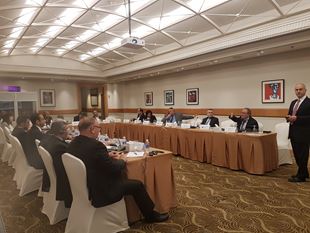 Some 18 members of parliament from 4 countries (Jordan, Egypt, Iraq and the West Bank and Gaza) met in Amman for a workshop on ‘Fostering Shared Prosperity in Challenging Times’ in November, 2019. Mario Mansour, METAC Director, gave a presentation on 21st century taxation and its role in addressing inequality and state building. He concluded that the MENA region’s tax revenue levels are low, and the tax composition isn’t best suited for long-term challenges compared to other regions. MPs discussed the importance of building trust with taxpayers by instituting good spending policies, building strong institutions, and applying laws equally. Mr. Mansour also presented the Fund’s work on the role of corruption as a brake on higher and more inclusive growth and the role of parliaments in budget oversight.
Some 18 members of parliament from 4 countries (Jordan, Egypt, Iraq and the West Bank and Gaza) met in Amman for a workshop on ‘Fostering Shared Prosperity in Challenging Times’ in November, 2019. Mario Mansour, METAC Director, gave a presentation on 21st century taxation and its role in addressing inequality and state building. He concluded that the MENA region’s tax revenue levels are low, and the tax composition isn’t best suited for long-term challenges compared to other regions. MPs discussed the importance of building trust with taxpayers by instituting good spending policies, building strong institutions, and applying laws equally. Mr. Mansour also presented the Fund’s work on the role of corruption as a brake on higher and more inclusive growth and the role of parliaments in budget oversight. 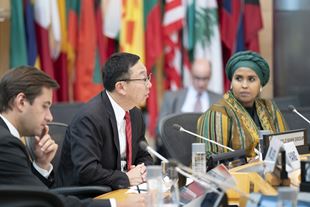 Some 50 Parliamentarians held a workshop on ‘Fighting Inequalities in a Shifting Global Landscape’ at the 2019 Annual Meetings in October. IMF Deputy Managing Director Tao Zhang spoke with MPs about policy advice to promote an inclusive growth agenda. MPs participated in sessions including Global Shifts and Inequality and Taxation as a Tool to Reduce Inequality. In the sessions, MPs emphasized the importance of education, and fighting corruption and gender inequality. They also discussed the role of international taxation in ensuring equality, the effectiveness of tax incentives for investment, and the importance of good governance for tax compliance.
Some 50 Parliamentarians held a workshop on ‘Fighting Inequalities in a Shifting Global Landscape’ at the 2019 Annual Meetings in October. IMF Deputy Managing Director Tao Zhang spoke with MPs about policy advice to promote an inclusive growth agenda. MPs participated in sessions including Global Shifts and Inequality and Taxation as a Tool to Reduce Inequality. In the sessions, MPs emphasized the importance of education, and fighting corruption and gender inequality. They also discussed the role of international taxation in ensuring equality, the effectiveness of tax incentives for investment, and the importance of good governance for tax compliance.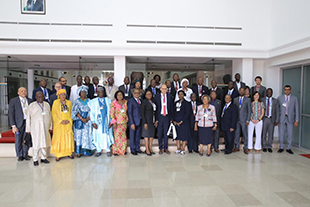 Thirty-two MPs from West Africa met in Abidjan for a three-day workshop at the IMF’s African Technical Assistance Center (AFRITAC). MPs had candid exchanges sharing their experiences and best practices in their countries. IMF staff and MPs discussed financial sector development to promote inclusive growth, revenue mobilization, and policies to fight corruption, among other topics.
Thirty-two MPs from West Africa met in Abidjan for a three-day workshop at the IMF’s African Technical Assistance Center (AFRITAC). MPs had candid exchanges sharing their experiences and best practices in their countries. IMF staff and MPs discussed financial sector development to promote inclusive growth, revenue mobilization, and policies to fight corruption, among other topics.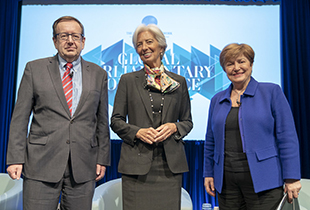 Some 150 parliamentarians gathered in the days leading up to the IMF/World Bank Spring Meetings for a conference on the theme of ‘Achieving the 2030 Agenda in the New Economy.’ The heads of the IMF and World Bank addressed MPs in a special session about sustainable, inclusive growth.
Some 150 parliamentarians gathered in the days leading up to the IMF/World Bank Spring Meetings for a conference on the theme of ‘Achieving the 2030 Agenda in the New Economy.’ The heads of the IMF and World Bank addressed MPs in a special session about sustainable, inclusive growth.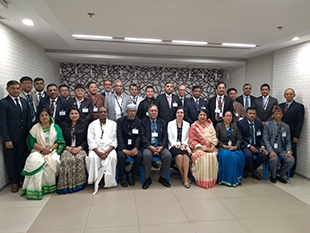 Around 20 MPs from Sri Lanka, Bhutan, Nepal, Bangladesh and India participated in a workshop at the South Asia Regional Technical Assistance Center in New Delhi. Participants engaged on themes including best practices in revenue mobilization, monetary policy, regional integration, and public financial management.
Around 20 MPs from Sri Lanka, Bhutan, Nepal, Bangladesh and India participated in a workshop at the South Asia Regional Technical Assistance Center in New Delhi. Participants engaged on themes including best practices in revenue mobilization, monetary policy, regional integration, and public financial management.